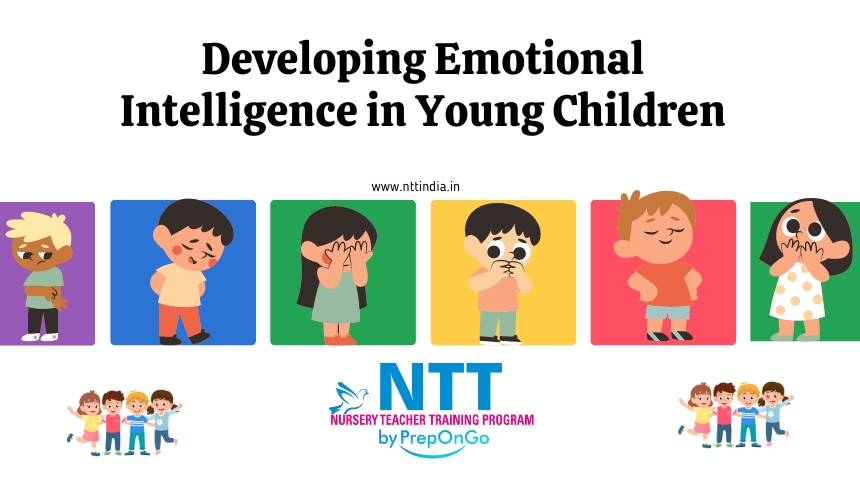Developing Emotional Intelligence in Young Children: Training Techniques at NTT India

Emotional intelligence (EI) is essential for young children as it helps them understand and manage their emotions, communicate effectively, and build positive relationships. At NTT India, we focus on developing emotional intelligence in young children through our comprehensive training techniques. This article will explore why emotional intelligence is crucial and how our training program equips nursery teachers with the skills to nurture EI in young children.
Why is Emotional Intelligence Important in Young Children?
Developing emotional intelligence in young children is vital for several reasons:
- Improved Social Skills: Children with high EI can better understand and interact with their peers.
- Better Academic Performance: Emotional intelligence helps children manage stress and stay focused on learning.
- Enhanced Mental Health: Understanding and expressing emotions can reduce the risk of anxiety and depression.
- Greater Resilience: Emotionally intelligent children can better cope with challenges and setbacks.
Training Techniques at NTT India for Developing Emotional Intelligence
At NTT India, we use various techniques to train nursery teachers in developing emotional intelligence in young children. Here are some of the key methods we employ:
-
Modeling Emotional Intelligence
Teachers learn to model emotionally intelligent behavior. By demonstrating how to handle emotions calmly and empathetically, teachers provide a powerful example for children to follow. We train our teachers to use appropriate language and actions to express their feelings and show empathy towards others.
-
Using Stories and Role-Playing
Stories and role-playing are effective tools for teaching emotional intelligence. Teachers are trained to use age-appropriate stories that illustrate various emotions and scenarios. Role-playing activities allow children to practice expressing their emotions and responding to others in a controlled environment.
-
Creating a Safe Emotional Environment
Our training emphasizes the importance of creating a safe and supportive classroom environment where children feel comfortable expressing their emotions. Teachers learn techniques to validate children’s feelings, listen actively, and provide reassurance, fostering a sense of security and trust.
-
Emotion Labeling and Validation
Teachers are taught to help children identify and label their emotions. This practice helps children understand their feelings and communicate them effectively. For instance, a teacher might say, “It looks like you’re feeling sad because your toy broke.” Validating these emotions shows children that their feelings are recognized and respected.
-
Teaching Emotion Regulation Strategies
NTT India trains teachers to equip children with tools to manage their emotions. Techniques such as deep breathing, counting to ten, or taking a break are taught to help children calm down when they feel overwhelmed. Teachers also learn to encourage children to talk about their feelings and find constructive ways to express them.
-
Encouraging Empathy
Promoting empathy is a crucial part of our training. Teachers are trained to encourage children to consider other people’s feelings and perspectives. Activities such as discussing how a character in a story might feel or how a friend might be affected by their actions help children develop empathy.
-
Incorporating Emotional Intelligence into Daily Activities
Teachers learn to integrate emotional intelligence into daily classroom activities. This includes group discussions, cooperative games, and art projects that encourage children to express their emotions and understand those of others. Regular practice helps reinforce these skills in a natural and engaging way.
Conclusion
Developing emotional intelligence in young children is a cornerstone of NTT India’s training program. By modeling emotional intelligence, using stories and role-playing, creating a safe environment, teaching emotion regulation, encouraging empathy, and incorporating EI into daily activities, our teachers are well-equipped to nurture emotionally intelligent children. These skills not only help children succeed academically and socially but also contribute to their overall well-being and resilience. Investing in emotional intelligence early on sets the foundation for a lifetime of positive relationships and emotional health.
